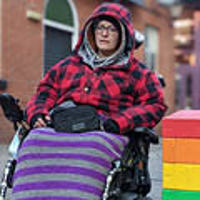We believe everyone should have the right to walk or wheel around our neighbourhoods with ease, independence and confidence. So we've partnered with Transport for All to share research and recommendations that will help decision-makers put the views and ideas of disabled people at the heart of policy, investment and practice for walking and wheeling.
Hear from disabled people in our Disabled Citizens' Inquiry
We believe walking and wheeling should be the most equitable mode of travel across the UK.
Everyone should have the freedom to walk or wheel independently around their neighbourhood.
But to achieve this, the experiences of disabled people need to be at the centre of policy, investment and delivery across the transport sector.
Streets that are difficult for disabled people to access and navigate can lead to poor health, reduced independence and increased isolation.
And alongside that, the cost-of-living crisis is disproportionately affecting disabled people.
52% of disabled people said the rising cost of living is affecting their ability to make essential journeys.
Bringing disabled people’s voices into the heart of decision-making can improve walking and wheeling for everyone.
That's why we're calling on local and national governments to give disabled people a voice when it comes to decisions that affect how they get around their local area.
The Disabled Citizens' Inquiry
We've teamed up with Transport for All to undertake UK-wide research funded by Motability.
This research looks at how disabled people experience walking and wheeling in the UK.
It provides recommendations made by disabled people to help decision-makers, and local and national government transport and planning teams make places and streets better for people.
We asked disabled people what would help them walk or wheel more
79%
said a panel of disabled people that reviews walking and wheeling policy and holds government to account
73%
believe stopping vehicles parking on pavements
79%
feel funding to maintain and improve pavements
88%
said services provided within walking distance of where they live
Download the Disabled Citizens' Inquiry report
The report summary is also available in a range of accessible formats:

Dennis, Greater Manchester
Although access to buses, trams and trains in Manchester has improved, nobody’s thought about how you get to them from your house.
We need honesty and dialogue to understand that it’s not just about the accessibility of buildings and buses, it’s about how we get to them in the first place.
Solutions designed by disabled people
The Disabled Citizens' Inquiry shares recommendations that have been developed by disabled people.
These solutions aim to make communities and neighbourhoods safer, more accessible and inclusive for disabled people.
The recommendations are:
1. Ensure disabled people inform walking and wheeling policy and practice
Disabled people need better representation in how decisions, funding and delivery happen, with a paid expert panel in all governments and local authorities.
2. Create long-term dedicated pavement funding to maintain and improve pavements
Ring-fence funding to ensure that pavements are better maintained and made accessible.
3. Stop pavement parking and manage pavement clutter
Prohibit pavement parking and better manage street clutter such as outdoor dining and electric vehicle chargers on pavements.
4. Improve walking and wheeling crossing points across roads and cycle paths
Improve and increase crossing points, including more dropped kerbs on quieter streets and zebra or signalised crossings in busy areas.
5. Make wayfinding and journey-planning tools work for disabled people
Develop standardised guidance and practice for accessible wayfinding provision, with visual signage, and tactile and audio cues.
6. Ensure disabled people have a choice to live within walking or wheeling distance of services and amenities
Amend national planning guidance to ensure new developments are built in the right locations, and ensure local plans and decisions facilitate walkable and wheelable neighbourhoods.
7. Improve access to mobility aids
Review and address barriers to disabled people accessing mobility aids, ensuring people can access the right mobility aid when they need it.
8. Improve off-road routes
Develop guidance and invest in national plans for making offroad routes accessible and inclusive.
9. Improve the integration of walking and wheeling with public transport
Ensure fully accessible walking and wheeling access to and on public transport, including stations, and interchanges where disabled people need to connect between modes.

Mark, Swansea
Pavement parking is a real problem because I’ve got to go on the road. And my guide dog Bobby can’t tell me if there are any cars coming. On a 200-yard walk, this could happen maybe four or five times.
Low flower beds in Morriston are quite a trip hazard too. As are all the tables, chairs and advertising boards outside shops in Swansea city centre. I’d like to see these changed.





